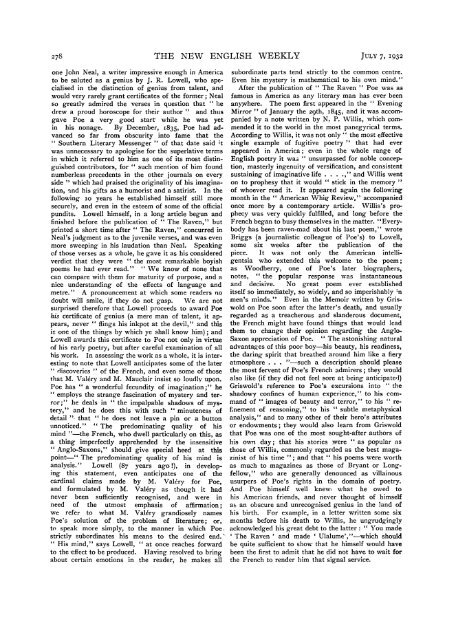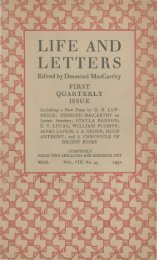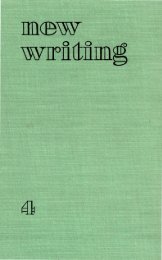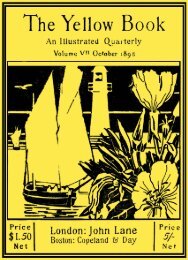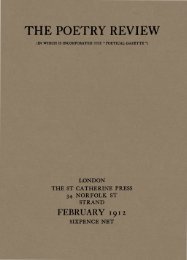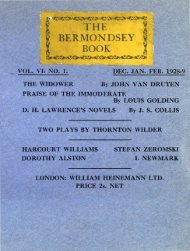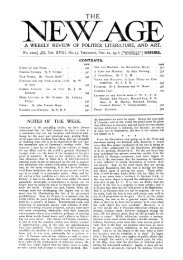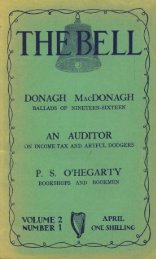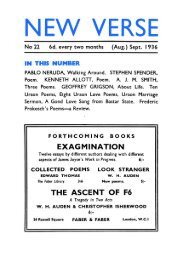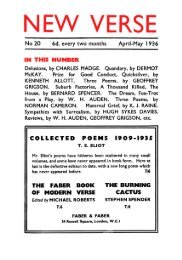Vol. I No. 12 - Modernist Magazines Project
Vol. I No. 12 - Modernist Magazines Project
Vol. I No. 12 - Modernist Magazines Project
Create successful ePaper yourself
Turn your PDF publications into a flip-book with our unique Google optimized e-Paper software.
278 THE NEW ENGLISH WEEKLY 7, 1932<br />
one John Neal, a writer impressive enough in America<br />
to be saluted as a genius by J. R. Lowell, who specialised<br />
in the distinction of genius from talent, and<br />
jvould very rarely grant certificates of the former; Neal<br />
so greatly admired the verses in question that " he<br />
drew a proud horoscope for their author " and thus<br />
gave Poe a very good start while he was yet<br />
in his nonage. By December, 1835, Poe had advanced<br />
so far from; obscurity into fame that the<br />
" Southern Literary Messenger " of that date said 't<br />
was unnecessary to apologise for the superlative terms<br />
in which it referred to him as one of its most distinguished<br />
contributors, for " such mention of him found<br />
numberless precedents in the other journals on every<br />
side " which had praised the originality of his imagination,<br />
and his gifts as a humorist and a satirist. In the<br />
following 10 years he established himself still more<br />
securely, and even in the esteem of some of the official<br />
pundits. Lowell himself, in a long article begun and<br />
finished before the publication of " The Raven," but<br />
printed a short time after " The Raven," concurred in<br />
Neal's judgment as to the juvenile verses, and was even<br />
more sweeping in his laudation than Neal. Speaking<br />
of those verses as a whole, he gave it as his considered<br />
verdict that they were " the most remarkable boyish<br />
poems he had ever read." " We know of none that<br />
can compare with them for maturity of purpose, and a<br />
nice understanding of the effects of language and<br />
metre." A pronouncement at which some readers no<br />
doubt will smile, if they do not gasp. We are not<br />
surprised therefore that Lowell proceeds to award Poe<br />
his certificate of genius (a mere man of talent, it appears,<br />
never " flings his inkpot at the devil," and this<br />
is one of the things by which ye shall know him); and<br />
Lowell awards this certificate to Poe not only in virtue<br />
of his early poetry, but after careful examination of all<br />
his work. In assessing the work as a whole, it is interesting<br />
to note that Lowell anticipates some of the later<br />
11 discoveries " of the French, and even some of those<br />
that M. Valery and M. Mauclair insist so loudly upon.<br />
Poe has " a wonderful fecundity of imagination;" he<br />
" employs the strange fascination of mystery and terror;"<br />
he deals in " the impalpable shadows of mystery,"<br />
and he does this with such " minuteness of<br />
detail " that " he does not leave a pin or a button<br />
unnoticed." " The predominating quality of his<br />
mind "—the French, who dwell particularly on this, as<br />
a thing imperfectly apprehended by the insensitive<br />
" Anglo-Saxons," should give special heed at this<br />
point—" The predominating quality of his mind is<br />
analysis." Lowell (87 years ago!), in develop<br />
ing this statement, even anticipates one of the<br />
cardinal claims made by M. Valery for Poe,<br />
and formulated by M. Valery as though it had<br />
never been sufficiently recognised, and were in<br />
need of the utmost emphasis of affirmation;<br />
we refer to what M. Valery grandiosely names<br />
Poe's solution of the problem of literature; or,<br />
to speak more simply, to the manner in which Poe*<br />
strictly subordinates his means to the desired end. v<br />
" His mind," says Lowell, " at once reaches forward<br />
to the effect to be produced. Having resolved to bring<br />
about certain emotions in the reader, he makes all<br />
subordinate parts tend strictly to the common centre.<br />
Even his mystery is mathematical to his own mind."<br />
After the publication of " The Raven " Poe was as<br />
famous in America as any literary man has ever been<br />
anyjvhere. The poem first appeared in the " Evening<br />
Mirror " of January the 2gth, 1845, and it was accompanied<br />
by a note written by N. P. Willis, which commended<br />
it to the world in the most panegyrical terms.<br />
According to Willis, it was not only " the most effective<br />
single example of fugitive poetry " that had ever<br />
appeared in America; even in the whole range of<br />
English poetry it was " unsurpassed for noble conception,<br />
masterly ingenuity of versification, and consistent<br />
sustaining of imaginative life . . . .," and Willis went<br />
on to prophesy that it would " stick in the memory "<br />
of whoever read it. It appeared again the following<br />
month in the " American Whig- Review," accompanied<br />
once more by a contemporary article. Willis's prophecy<br />
was very quickly fulfilled, and long before the<br />
French began to busy themselves in the matter. *' Everybody<br />
has been raven-mad about his last poem," wrote<br />
Briggs (a journalistic colleague of Poe's) to Lowell,<br />
some six weeks after the publication of the<br />
piece. It was not only the American intelligentsia<br />
who extended this welcome to the poem;<br />
as Woodberry, one of Poe's later biographers,<br />
notes, " the popular response was instantaneous<br />
and decisive. <strong>No</strong> great poem ever established<br />
itself so immediately, so widely, and so imperishably ;n<br />
men's minds." Even in the Memoir written by Griswold<br />
on Poe soon after the latter's death, and usually<br />
regarded as a treacherous and slanderous document,<br />
the French might have found things that would lead<br />
them to change their opinion regarding the Anglo-<br />
Saxon appreciation of Poe. " The astonishing natural<br />
advantages of this poor boy—his beauty, his readiness,<br />
the daring- spirit that breathed around him like a fiery<br />
atmosphere . . . "—such a description should please<br />
the most fervent of Poe's French admirers; they would<br />
also like (if they did not feel sore at being anticipated)<br />
Griswold's reference to Poe's excursions into " the<br />
shadowy confines of human experience," to his command<br />
of " images of beauty and terror," to his " refinement<br />
of reasoning," to his " subtle metaphysical<br />
analysis," and to many other of their hero's attributes<br />
or endowments; they would also learn from Griswold<br />
that Poe was one of the most sought-after authors of<br />
his own day; that his stories were " as popular as<br />
those of Willis, commonly regarded as the best magazinist<br />
of his time "; and that " his poems were worth<br />
as much to magazines as those of Bryant or Longfellow,"<br />
who are generally denounced as villainous<br />
usurpers of Poe's rights in the domain of poetry.<br />
And Poe himself well knew^ what he owed to<br />
his American friends, and never thought of himself<br />
as an obscure and unrecognised genius in the land of<br />
his birth. For example, in a letter written some six<br />
months before his death to Willis, he ungrudgingly<br />
acknowledged his great debt to the latter : " You made<br />
' The Raven ' and made ' Ulalume',"—which should<br />
be quite sufficient to show that he himself would have<br />
been the first to admit that he did not have to wait for<br />
the French to render him that signal service.


